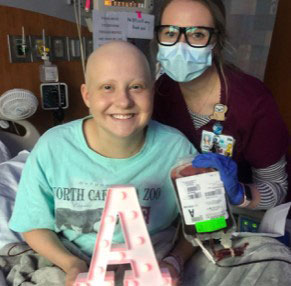
Amanda Haufler was like so many high school students waiting to return to a bit of normalcy as the COVID-19 pandemic lagged on. In preparation for a return to hybrid learning and resuming sports, her mother scheduled an appointment for Amanda’s physical in August 2020.
“I was definitely ready for school. I was ready for basketball,” Amanda recalled.
Among many other typical tests conducted during a physical, doctors checked Amanda’s complete blood count. What followed was a series of medical exams that led to a shocking diagnosis. Amanda had high-risk Acute Myeloid Leukemia (AML), a blood cancer that starts in the bone marrow. Chemotherapy alone wouldn’t be enough to treat her. She needed a special bone marrow donor to fight this battle.
Life changed drastically in a matter of weeks. The 15-year-old basketball player who was conditioned to playing up to four hours each day, would be confined to a hospital bed receiving a series of chemotherapy treatments and procedures over the next year battling AML.
“The first two weeks of chemo, I don’t remember much,” said Amanda. “It was overwhelming.”
Amanda does remember how grateful she was after receiving a blood transfusion. “I was really tired and after I got it, I felt very energized.”
“Their bond has gotten stronger”
In the first days of her diagnosis, doctors advised that Amanda would need a bone marrow transplant. For many patients, finding a match can be a long and difficult process. But the odds were in Amanda’s favor this time. Her younger sister Lydia, who only had a 25% chance to be a match, was indeed a perfect match and agreed to be her older sister’s donor.
The upcoming transplant brought on a great sense relief to the family knowing they had a game plan, especially for their mother Deb.
“It was overwhelming as a parent and I was just so very grateful for the amazing support we received from our community,” Deb expressed.
While her eldest daughter endured another series of chemo treatments, her youngest was put through a menagerie of tests as a bone marrow donor. The Haufler family was not able to enjoy the comforts and traditions of home over the holiday season. Amanda began the exhausting preparation required for the BMT, which meant chemo for Christmas as well.
“We were dealing with the new world of COVID and on top of that cancer,” said Deb.
Amanda and Lydia had been separated from one another for weeks at a time with the longest being four months. On New Year’s Eve, the sisters were reunited during the BMT surgery.
“It’s been a family affair,” said Deb. “Their bond has definitely grown stronger through this experience.”
Amanda agrees that she now shares a special connection with Lydia. “I was glad she was there. I didn’t get to see her for Christmas, nor could she visit me during my inpatient stays due to COVID and my compromised immune system.”
The transplant was successful, but as Deb explained there was still quite a road to recovery ahead. After receiving the bone marrow transplant, Amanda’s body needed time to adapt and be rejuvenated. Amanda was receiving blood product transfusions frequently.
“Every other day. Sometimes every day,” shared Deb. She considers platelets essential to fighting cancer.
Full Circle Moment
During chemotherapy, cancer patients produce fewer platelets, which can delay critical treatments. Over the course of her treatment, Amanda received more than 50 blood and platelet transfusions.
“I didn’t fully understand the gravity and importance until Amanda was diagnosed. We have to keep donating and spreading the message, I have seen firsthand it saves lives,” Deb emphasized. “The time it takes to donate makes all the difference to those patients battling cancer.”
Experiencing her daughter receiving blood and platelet transfusions was a full circle moment for Deb. She’s been an avid donor over the years.
Prior to Amanda’s diagnosis, she and her sister Lydia volunteered at their school’s blood drives as members of the Red Cross Club. Today, they have a profound reason to rally donors. Amanda’s journey has inspired many people in their community.
Amanda said seeing how critical blood and platelets were to her survival was an eye opener for those closest to her. “A lot of people are skeptical about donating blood, but when they see someone close to them go through it, they understand the importance.”
Amanda’s diagnosis left a tremendous impact on their family and shifted their perspective – to have gratitude for the little things. Through it all, Deb says her message to the community is “Do good and be kind – you never know how much YOUR DIFFERENCE can make ALL THE DIFFERENCE.”